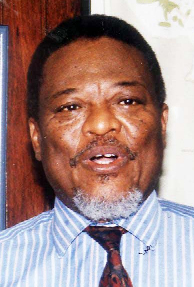-Prime Minister
Prime Minister Samuel Hinds has said that a final draft of the Broadcast Bill is currently being reviewed before it is tabled in Parliament and he is rejecting claims that the administration has downplayed a High Court ruling on broadcast licences.

He equated movement on the legislation by government as recognition of the court’s ruling, but repeatedly stressed that time is needed time to “put things into place.” Hinds’ comments were made on Sunday during an interview on Christopher Ram’s television programme ‘Plain Talk’.
Hinds spoke of when the PPP gained power in 1992, saying the party had agreed on setting the standard for distinguishing between applications and also approving them. He said too that the question of content is another factor in the evaluation process. Hinds said the administration has “no veto over the court ruling” and is proceeding to implement the law.
Hinds, recalled that that in 1992 every village along the coast that seemed to have an Indian Guyanese majority wanted to have village radio at the time. He said government could have gone ahead and granted them all, but “we did not.” He continued, “…the issue of going ahead to grant broadcast licences is a very sensitive [social and political] issue in this country.”
Ram reminded him of the President’s assertion that a Freedom of Information (FOI) Bill would have been tabled some time last year and the time has since elapsed. Hinds said this is being looked at, adding “certainly it was his earnest aspiration to get it done.” He added that some things are complicated.
Further, the Prime Minister stressed that the important thing is for the law when presented to be reasonably accepted by the public. He said the administration can go ahead and simply implement a bill which reflects its own positions, but that “it has no such intentions.”
The administration has failed to act on the two-year-old FOI bill tabled by AFC leader Raphael Trotman, who said the announcement of plans to table legislation was an attempt to save face after questions about governance, corruption, and transparency in Guyana were raised by the party in a full-page advertisement placed in the Trinidad Express during the Summit of the Americas last year.
The main opposition PNCR-1G as well as GAP/ROAR have both publicly pledged their support for the AFC bill and according to Trotman the party had always indicated its willingness to engage the governing party on advancing the legislation.
The AFC recently issued a public reminder to the administration of Jagdeo’s promise to table long-awaited legislation. It also stated that the government should remember that the party has already placed legislation before the National Assembly designed to achieve the same objective of providing access to information to members of the public.
In 2001, the Advisory Commission on Broadcasting (ACB) was established based on an agreement between then PNCR leader and President Bharrat Jagdeo, pending the passage of broadcast legislation and the setting up of a broadcast authority. The ACB was set up with the objective that broadcast legislation would be enacted within a specific timeframe, and to this end, a joint committee on radio monopoly, non-partisan boards and broadcasting legislation was established. The joint committee in its report had laid out the general parameters for the drafting of the legislation and the Attorney General’s Chambers drafting section had used those parameters and studied legislation from other countries in preparing a draft. This draft was published in the daily newspapers and members of the public and other stakeholders were invited to submit suggestions.
